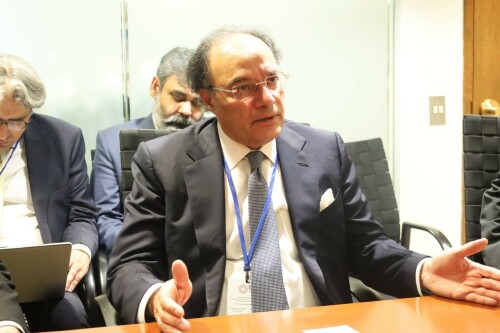Pakistan Eyes Financial Markets with Panda and ESG Bonds
During crucial discussions with representatives from Deutsche Bank and Moody’s in Washington, Finance Minister Muhammad Aurangzeb conveyed Pakistan’s eagerness to re-enter financial markets. This includes the potential issuance of Panda and ESG bonds, according to a statement released by the Finance Division.
These discussions occurred on the sidelines of the International Monetary Fund (IMF) and World Bank Group’s Spring Meetings for 2025.
Deutsche Bank Meeting
In a meeting with the Deutsche Bank delegation, led by Myriam Ouazzani, Managing Director for the MENA region, Aurangzeb highlighted “Pakistan’s ambition to return to the financial markets. This will be achieved partly through issuing Panda and ESG (environmental, social, and governance) bonds, bolstered by the nation’s macroeconomic stability and recent upgrades in credit ratings,” the statement noted.
Understanding Panda and ESG Bonds
- Panda Bonds: These are debt instruments denominated in yuan and issued by foreign entities within China’s domestic market. They offer an alternate funding avenue for governments and corporations aiming to access China’s substantial liquidity, while simultaneously promoting the globalization of the Chinese yuan (RMB).
- ESG Bonds: These are fixed-income securities designed to generate capital for initiatives aligning with environmental, social, and governance principles. These bonds enable issuers to fund projects that positively influence areas like renewable energy, social justice, and corporate governance. For investors, ESG bonds provide an opportunity to support responsible investment strategies while earning returns, as indicated by information available on the Nasdaq website.
Moody’s Meeting
During his engagement with the Moody’s commercial team in Washington, D.C., Aurangzeb provided insights into “Pakistan’s macroeconomic prospects, underscoring fiscal and current account surpluses, decreased inflation, a consistent foreign exchange rate, and enhanced reserves,” according to the Finance Division.
“He also gave updates on the Panda Bond issuance and agreed to pursue discussions on potential future collaboration.”
In January of this year, Aurangzeb indicated that Pakistan intended to secure approximately $200 million to $250 million from Chinese investors through Panda Bonds.
Later, in March, the finance minister stated that Pakistan was in the process of launching its inaugural Panda Bond in the Chinese market during the current calendar year (2025).
“I have been advocating, and I am very keen, that Pakistan—taking advantage of the second-largest and deepest capital market in the world—goes for an inaugural Panda bond,” the minister mentioned in an interview.



Comments (0)
No comments yet. Be the first to comment!
Leave a Comment